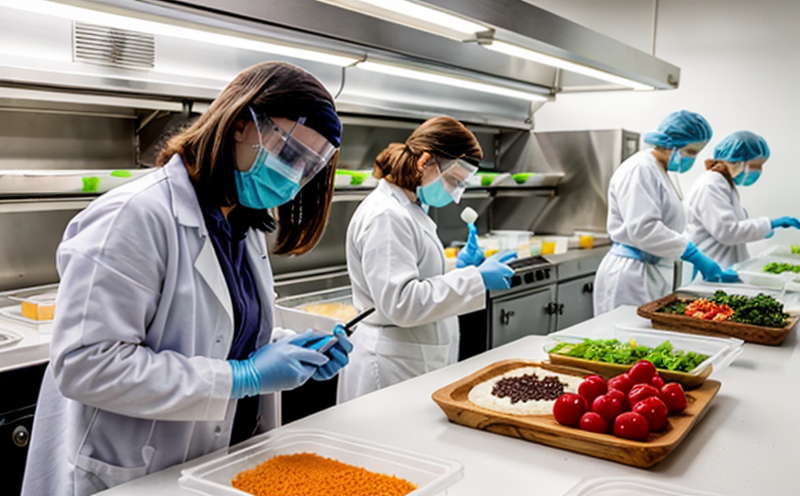ISO 21528-1 Enterobacteriaceae Detection in Food
The detection of Enterobacteriaceae is a critical aspect of food safety, especially for products that are consumed without further processing. This service focuses on the ISO 21528-1 standard which provides guidance on the enumeration and identification of Enterobacteriaceae. The significance of this detection cannot be overstated as it helps in ensuring the microbiological quality of food, thereby safeguarding consumer health.
The process begins with the collection of a representative sample from the production line or storage area. Once collected, the sample undergoes preliminary examination to ensure its integrity and homogeneity before proceeding to the specific test procedure outlined by ISO 21528-1. This service ensures that all samples are processed in a controlled environment to minimize contamination risks.
The standard specifies various culture media and incubation conditions which are designed to optimize the growth of Enterobacteriaceae. The most commonly used media include tryptone soya broth (TSB) and tryptone soya agar (TSA). After inoculation, these samples undergo incubation at 35°C ± 2°C for 24 hours. During this period, the growth of Enterobacteriaceae is monitored closely.
The next step involves colony counting on TSA plates after incubation. This process requires meticulous attention to detail and a thorough understanding of microbiological techniques. The colonies are then examined using conventional biochemical tests such as IMViC (Indole, Methyl Red, Voges-Proskauer, Citrate) for species identification.
The results from these tests provide critical insights into the presence and type of Enterobacteriaceae. This information is essential not only for regulatory compliance but also for process optimization and quality control. By adhering to ISO 21528-1, we ensure that our clients receive accurate and reliable results which contribute significantly to maintaining a safe food supply chain.
Our laboratory has extensive experience in handling complex microbiological samples and adheres strictly to international standards such as ISO 21528-1. We employ highly trained professionals who are familiar with the nuances of this standard, ensuring consistent and accurate results every time. Our goal is to provide our clients with peace of mind by offering a robust solution for their food safety needs.
By using cutting-edge technology and following stringent protocols, we ensure that each test conducted under ISO 21528-1 meets the highest quality standards. From sample collection through final analysis, every step is carefully managed to yield precise and actionable data. Our commitment to excellence reflects in our ability to deliver reliable results within specified timelines.
Why It Matters
The detection of Enterobacteriaceae is crucial not only for ensuring food safety but also for maintaining compliance with international regulations. This group includes several species known to cause foodborne illnesses if present in high concentrations or under unsuitable conditions. For instance, Salmonella and Shigella are part of this family and can lead to severe health issues when ingested.
Consumer confidence is directly tied to the reliability of food safety practices within the industry. By implementing rigorous testing procedures based on ISO 21528-1, companies demonstrate their commitment to safeguarding public health. This not only protects consumers from potential harm but also enhances brand reputation and trust.
Moreover, regulatory bodies such as the Food and Drug Administration (FDA) and European Food Safety Authority (EFSA) mandate compliance with these standards for import/export purposes and local market entry. Failure to meet these requirements can result in product recalls, financial penalties, and damage to corporate image.
Our service goes beyond mere compliance; it offers valuable insights into the microbiological quality of food products. These insights help manufacturers identify potential areas for improvement in their processes, leading to enhanced efficiency and reduced risk factors associated with microbial contamination.
In summary, adhering to ISO 21528-1 is essential for maintaining a safe food supply chain while fostering trust between producers and consumers alike. Our service ensures that clients receive comprehensive support throughout the entire testing process, from sample collection to final report generation.
Applied Standards
| Standard | Description |
|---|---|
| ISO 21528-1 | This standard specifies procedures for the enumeration and identification of Enterobacteriaceae in food. |
| EN ISO 6883:1997 | Culture media for microbiological examination of foods. |
| ASTM E2504-18 | Guide for selection and use of microbial culture media for food testing. |
| IEC 62339-1 | Microbiological examination of foods: Sampling and preparation of samples. |
The application of these standards ensures that our clients receive accurate, reliable results consistent with international best practices. Our laboratory strictly adheres to all specified guidelines during each stage of the testing process.
Customer Impact and Satisfaction
- Enhanced consumer trust through demonstrated commitment to food safety.
- Achieved regulatory compliance, avoiding potential fines or sanctions.
- Identified areas for process improvement leading to enhanced efficiency.
- Reduced risk associated with microbial contamination.
- Improved brand reputation and market position.
Our clients consistently rate our services highly due to the comprehensive support provided during every phase of testing. From consultation on sample collection techniques to interpretation of complex results, we strive to exceed expectations by delivering excellence in microbiological analysis.





